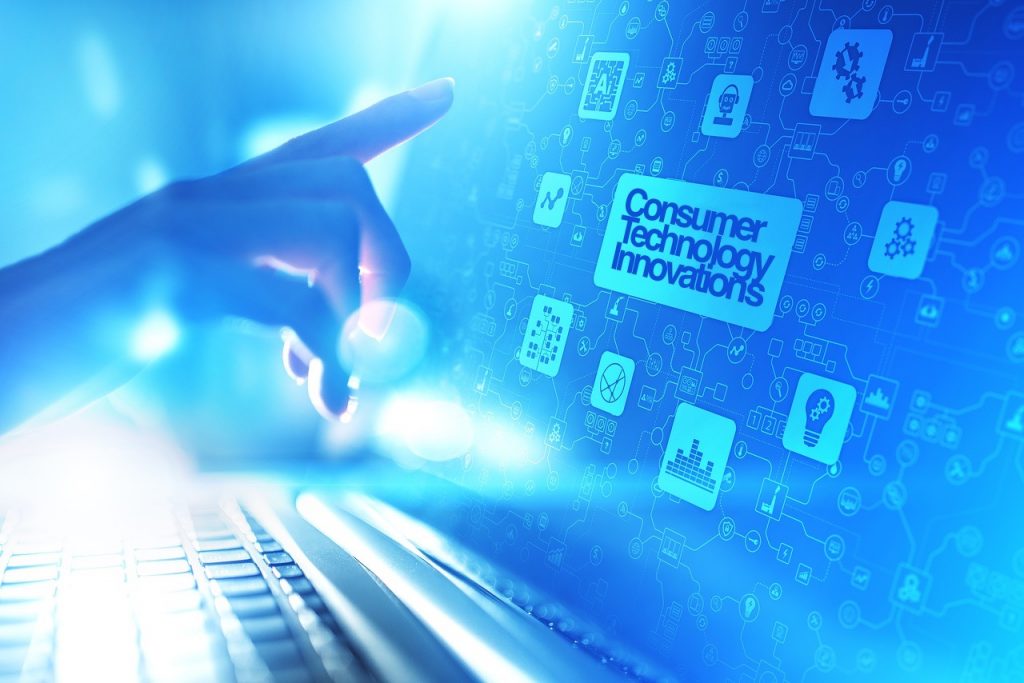Which advancements offer the most promise? Below are some of the consumer technology innovations that are making the biggest impact in today and tomorrow’s market.
Artificial Intelligence and Machine Learning
From avatars to chatbots, artificial intelligence is behind a majority of devices we take for granted. Software development providers are integrating it into appliances like microwaves, which can auto-detect what you want to cook and the speed and power that’s necessary for heating your meal. Smartphones that let consumers take photos in portrait mode are the result of AI as well. AI is also the technology behind self-driving cars, as well as features that make driving safer for the driver, passengers, and pedestrians. For example, sensors can correct the driver when the car is veering into another lane. Machine learning, a facet of AI that performs certain tasks automatically, is becoming integral to everyday life, too. For instance, facial recognition software that enables auto-tagging on social media platforms like Facebook has machine learning to thank. As it replaces the repetitive tasks previously performed by humans, increasingly, organizations will be outsourcing software development to improve their products and create new ones incorporating this technology.
Voice Assistance
Siri and Alexa are household names — literally, they have become part of people’s households. But voice assistance technology will improve consumers’ lives beyond the home as well. Students, for instance, will turn to them as study aids, using them as resources for information, while professionals across healthcare and more will be using them to record and playback notes, among other features.
Internet of Things (IoT)
The IoT already plays a major role in the world of consumer tech, connecting devices to perform previously unimaginable tasks. Users can power their smart cookers, adjusting the temperature of their recipes and setting timers, from miles away via their smartphones. A smart home system can trace patterns and power the lights and heat based on when the occupants typically come home and leave. These are just some of the uses of the IoT. As the capabilities of the IoT reach new heights, organizations will need to continue to use software development providers to bring their products and services into the fold to stay relevant.
Augmented Reality (AR) and Virtual Reality (VR)
Pokemon Go brought AR into the forefront of our consciousness four years ago, incorporating digital aspects into a real-life experience — in this case, a game — via a mobile device camera. VR provides an immersive experience in which users feel as though they are actually in a different world. AR and VR have taken over the gaming world. But software development companies have opportunities that extend beyond consumer recreation. For instance, educators are using these tools in the classroom to demonstrate science experiments or allow students to “see” periods in history up close and personal.
Blockchain
Blockchain, a secure system of storing consumer information in unalterable, linked blocks, is no longer just used in the world of cryptocurrency. It’s already made its way into sectors such as banking and investing, retail sales, insurance, entertainment, ridesharing, and much more. Given the protection and safety it offers consumers, who are submitting confidential and sensitive data, numerous industries will be turning to software development services to adopt it in the future. We could even see it become part of the voting process to track and count ballots, helping prevent voter fraud. Every day, businesses are finding new ways of making consumers’ lives easier and a little more interesting with the help of software development industries. They’re developing smart systems and creating new tools and processes that defy expectations and imagination. As the technological landscape continues to evolve and we see more and more innovations and advancements on the horizon, businesses across a wide range of industries, from entertainment to education to pharmaceutical companies, will be outsourcing software development to incorporate these features and technologies into their products and services. Doing so will allow them to stay competitive in an ever-changing market and meet and exceed the needs of their consumers. After all, the success of their brands — and their very survival — depend on it.
